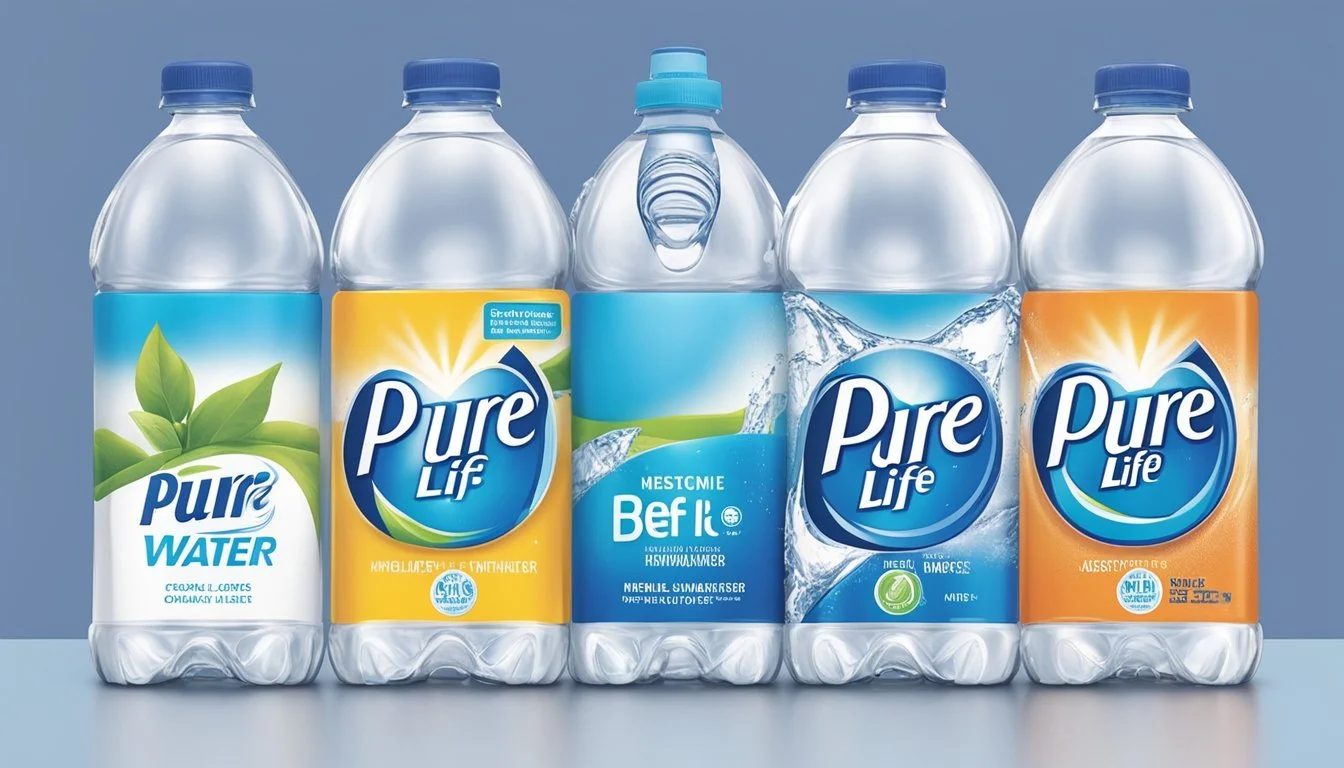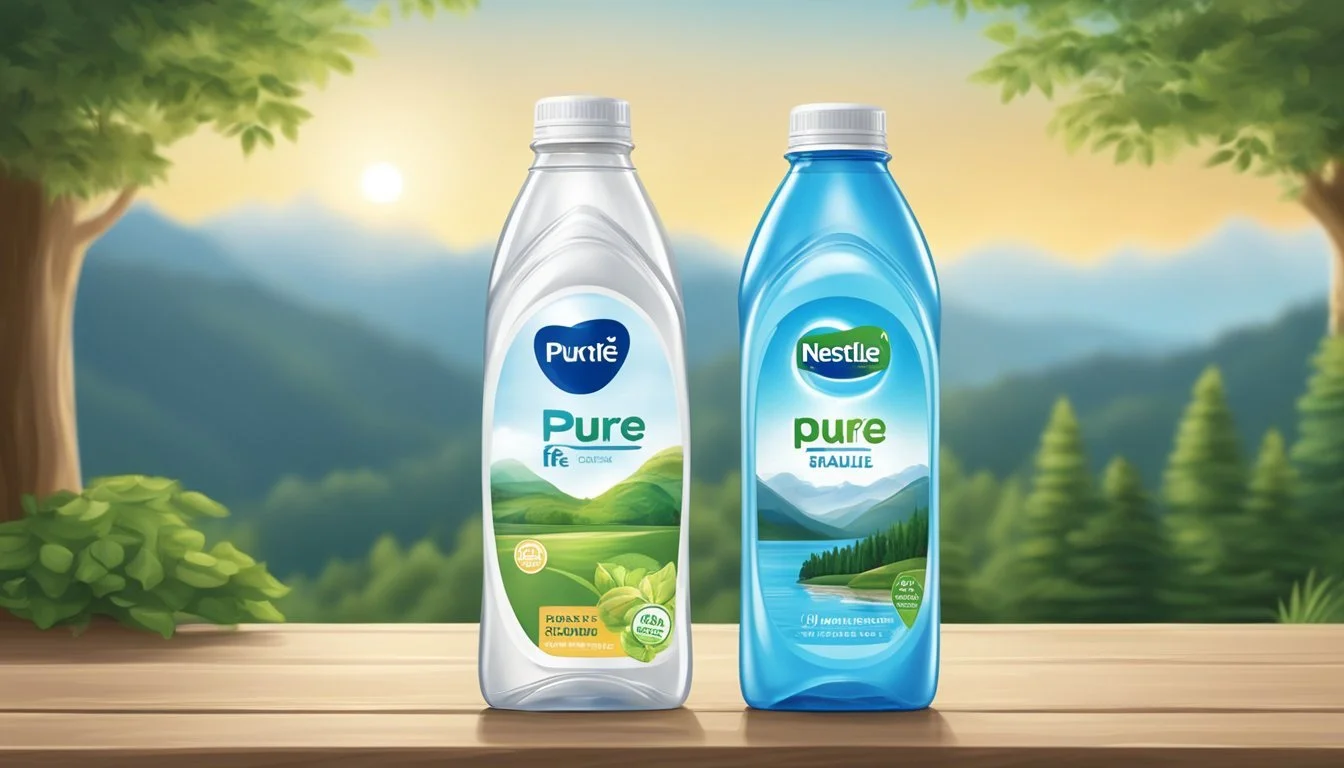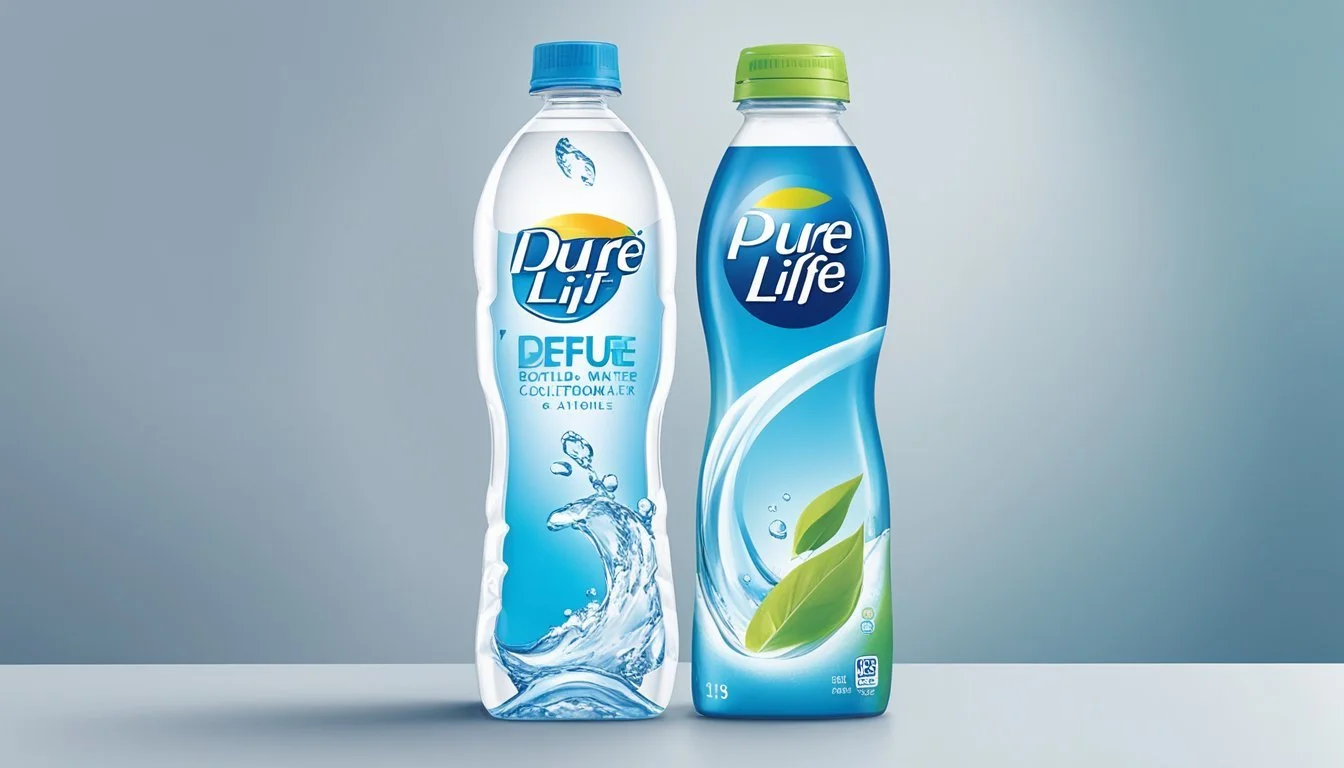Nestlé Pure Life vs. Defy
A Comprehensive Bottled Water Comparison
When it comes to choosing bottled water, consumers often find themselves comparing numerous brands to find the best option for quality and taste. In the battle between Nestlé Pure Life and Defy, both brands have unique qualities that make them stand out in the crowded bottled water market.
Nestlé Pure Life, renowned for its wide reach and purified, reliable taste, ensures consistency through rigorous filtration processes. On the other hand, Defy offers a fresh take with its claim of superior purity and a commitment to sustainable practices, appealing to environmentally conscious consumers.
This head-to-head comparison looks at various aspects, from taste and sourcing to environmental impact and brand reputation. Each brand brings something different to the table, making it essential to understand what matters most to you when choosing the perfect bottled water.
Understanding Bottled Water
Bottled water comes in various types with different sources, processing methods, and safety regulations. It's essential to understand these aspects to make informed choices about hydration options.
Categories of Bottled Water
Bottled waters can be categorized based on their sources and treatment processes:
Spring Water: Sourced from an underground formation from which water flows naturally to the surface. It often retains natural minerals and electrolytes.
Purified Water: Undergoes processes such as distillation, deionization, or reverse osmosis to remove impurities like lead, arsenic, and cadmium. Common brands include Nestlé Pure Life.
Mineral Water: Contains a certain level of dissolved minerals, such as calcium and magnesium. The mineral content must remain constant.
Each type serves different consumer needs, from taste preferences to health benefits.
Regulation and Safety
Bottled water safety is regulated to ensure it meets specific standards. In the U.S., the Food and Drug Administration (FDA) sets guidelines, while the Environmental Protection Agency (EPA) regulates tap water.
Many manufacturers follow International Bottled Water Association (IBWA) standards, focusing on:
Contaminant Limits: Controls for harmful elements like lead, arsenic, and cadmium.
Quality Assurance: Frequent testing for microorganisms and chemical impurities.
Packaging Safety: Ensures plastic bottles do not leach harmful substances into the water.
These regulations help maintain consumer confidence in the safety and quality of bottled waters.
Labeling and Transparency
Labeling on bottled water provides crucial information about its quality and origin. Key elements include:
Source Identification: Details if it’s spring, mineral, or purified water.
Mineral Content: Lists the concentration of minerals and electrolytes, essential for health considerations.
Processing Methods: Explains any purification or treatment processes used.
Consumers should look for transparency in labeling, ensuring they understand what they are drinking. Some brands offer detailed reports on their websites, enhancing trust and informed decision-making.
Clear labeling helps differentiate between various types of bottled waters and assists consumers in selecting a product that aligns with their health needs and personal preferences.
Profile of Nestlé Pure Life
Nestlé Pure Life offers bottled water that emphasizes a combination of stringent purification methods and environmental considerations. Below is an in-depth look at its production process, water quality, and environmental initiatives.
Production Process
Nestlé Pure Life undergoes a sophisticated filtration process. The water is sourced from multiple locations and subjected to a process called reverse osmosis. This method ensures that impurities and contaminants are effectively removed.
After initial filtration, minerals are added back into the water to enhance taste and replenish essential electrolytes. The added minerals often include calcium, magnesium, and potassium.
The bottling process follows strict quality control protocols to maintain consistency. Each batch is tested for microbial and chemical contaminants, ensuring the water is safe to consume.
Water Quality and Content
Nestlé Pure Life is purified water known for its neutral taste. The purification process includes microfiltration, carbon filtration, and reverse osmosis.
Key components of the water include a specific blend of added minerals. These minerals contribute to a balanced pH level and can provide a more refreshing taste compared to some other bottled waters.
Independent studies have indicated that Nestlé Pure Life contains low levels of dissolved solids, which is a measure of the water's purity. This makes it favorable for people looking for clean and crisp hydration without a strong mineral taste.
Environmental Initiatives
Nestlé places a strong emphasis on reducing its environmental footprint. One significant effort is the shift towards using recycled plastic (rPET) for its bottles. This reduces the need for virgin plastic and promotes recycling.
Plastic waste is a key concern, and Nestlé Pure Life promotes recycling through community programs and partnerships. The company aims to make 100% of its packaging recyclable or reusable by 2025.
Nestlé also addresses concerns about BPA by ensuring that all plastic used is BPA-free, mitigating potential health risks associated with plastic bottles. Furthermore, initiatives are put in place to reduce water usage during production and improve the sustainability of water sourcing practices.
Profile of Defy
Defy is a bottled water brand known for its high-quality sourcing and commitment to health benefits, as well as its eco-friendly packaging efforts. The detailed exploration of Defy will highlight its sourcing methods, health features, and environmental initiatives.
Sourcing and Purity
Defy sources its water from pristine natural springs located in ecologically rich areas. The brand ensures minimal processing, which helps retain the natural minerals of the water.
The water undergoes rigorous filtration processes to eliminate contaminants while preserving its natural taste and purity. This commitment to purity is evident in every bottle, offering consumers a reliably clean and refreshing hydration option.
Health Benefits and Features
Defy’s water is enriched with essential electrolytes such as potassium and magnesium. These are added to support optimal hydration and replenish minerals lost through sweat during physical activities.
Defy avoids artificial additives, sweeteners, and preservatives, making it a healthier choice for daily consumption. The neutral pH balance of the water ensures that it is gentle on the stomach and suitable for all age groups.
Sustainability and Packaging
Defy takes pride in its environmentally conscious packaging efforts. The brand uses bottles made from 100% recycled materials, significantly reducing its carbon footprint.
To further promote eco-friendliness, Defy encourages consumers to recycle the bottles after use. The packaging design is sleek and functional, making it easy to carry and store without compromising the quality of the water.
These initiatives reflect Defy's dedication to sustainability and responsible consumption.
Comparative Analysis
This comparative analysis evaluates the taste profile, nutrient composition, market presence, consumer preferences, and the environmental and social responsibilities of Nestlé Pure Life and Defy bottled water brands.
Taste Profile
Nestlé Pure Life is known for its consistent taste, achieved through a multi-step filtration process. It aims to deliver a refreshing and clean flavor, free from any noticeable aftertaste. Consumers often appreciate the crispness of Pure Life, making it a popular choice for regular hydration.
Defy, on the other hand, positions itself uniquely in the market with its alkaline water. It claims to offer a smoother, less acidic taste, which some consumers find more appealing, especially those looking for a more luxurious hydration experience.
Nutrient Composition
Nestlé Pure Life is primarily purified water with a few added minerals to enhance taste. Its nutrient profile is simple, focusing on providing clean hydration with minimal additional elements.
Defy differentiates itself with its alkaline water, which boasts a higher pH level. This higher pH is achieved through the incorporation of electrolytes and minerals, including magnesium, calcium, and potassium. This composition is aimed at health-conscious consumers looking for added benefits in their bottled water.
Market Presence and Consumer Preferences
Nestlé Pure Life is one of the largest bottled water brands globally. Its wide availability in various retail formats makes it easily accessible. The affordability and consistent quality have contributed to its extensive consumer base.
Defy, while not as widely recognized as Nestlé Pure Life, has carved out a niche in the premium bottled water market. Its focus on alkaline water and health benefits appeals to a specific segment of consumers seeking more than just hydration.
Environmental and Social Responsibility
Nestlé Pure Life has faced criticism for its environmental impact, particularly concerning plastic waste. The company has made commitments to improve sustainability by increasing the use of recycled materials and reducing plastic usage in packaging.
Defy emphasizes its commitment to environmental responsibility through eco-friendly packaging. The brand often highlights its efforts to minimize environmental impact, including using recyclable materials and supporting water conservation initiatives.
Nestlé's extensive efforts in community support and sustainable sourcing reflect a broader approach to social responsibility. Defy also engages in various social initiatives, focusing on health and wellness campaigns aimed at improving community well-being.
Health Implications
When choosing bottled water, it is crucial to consider the health impacts. Important factors include how well the water contributes to hydration and whether it is free from harmful contaminants such as heavy metals and chemicals.
Hydration and Body Health
Nestlé Pure Life provides clean, filtered water that helps maintain hydration levels, which is essential for various bodily functions. Proper hydration supports kidney function, regulates body temperature, and improves cognitive performance. Defy, known for its alkaline water, claims to balance body pH levels. This can potentially reduce acid in the bloodstream and improve energy levels.
Both brands provide options that suit different health needs, but ensuring consistent hydration remains the most significant benefit.
Contaminants and Safety Concerns
Nestlé Pure Life boasts multiple-stage filtration to minimize contaminants. It is regularly tested to ensure it meets safety standards, protecting consumers from harmful substances like lead and arsenic. The brand also avoids contaminants commonly found in tap water.
Defy's purification processes aim to keep the water free from heavy metals and other impurities. However, because it emphasizes alkaline properties, it is distinct from the neutral profile of Nestlé Pure Life. Choosing between the two involves considering individual safety preferences regarding contaminant levels.
Environmental Considerations
When comparing Nestlé Pure Life and Defy, it's crucial to examine their environmental impact. This examination will focus on water sourcing and eco-systems as well as plastic use and waste management.
Water Sourcing and Eco-Systems
Nestlé Pure Life sources its water from both municipal supplies and natural springs. The water undergoes multiple stages of filtration to ensure purity and safety.
Defy, in contrast, specializes in alkaline water sourced from protected springs. They emphasize minimal eco-system disruption and responsible water extraction practices.
Defy’s focus on sustainable water sourcing aims to preserve natural habitats and biodiversity. Both companies claim to adhere to stringent safety and quality standards but differ in their sourcing methods.
Plastic Use and Waste Management
The environmental footprint of plastic waste is a significant concern. Nestlé Pure Life primarily uses plastic bottles, which contribute to global plastic pollution. Despite attempts at recycling programs, a large percentage of bottles end up in landfills.
Defy opts for more eco-friendly packaging solutions. They utilize biodegradable and recyclable materials to minimize plastic waste. Their approach aims to reduce the reliance on single-use plastics.
Consumers should consider the long-term environmental impact of plastic use. Both companies are making efforts, but their strategies and outcomes vary, impacting waste management and recycling efficiency.
Consumer Insights
Nestlé Pure Life and Defy are compared based on various consumer preferences and trends. These include water quality, packaging, and eco-friendliness.
Preferences and Trends
Consumer Preferences: Consumers value water quality highly, often checking pH levels and looking for clean, natural taste. Nestlé Pure Life is known for its neutral, balanced taste. Defy markets itself towards a younger audience by emphasizing a bold, crisp flavor profile, appealing to those seeking a distinctive taste.
Convenience and Packaging: Both brands focus on convenience, offering various bottle sizes. Nestlé Pure Life often packages in larger quantities which appeals to bulk buyers, while Defy may appeal to individual consumers due to its ergonomically designed, easy-to-carry bottles.
Eco-Friendly Concerns: Eco-friendliness plays a significant role. Defy tends to use more sustainable packaging materials, making it a preferred choice for environmentally conscious consumers. In contrast, Nestlé Pure Life has also implemented strict quality controls and aims for sustainability in their processes.
These insights help in understanding why consumers might prefer one brand over another.
Innovation in the Bottled Water Industry
Innovation in the bottled water industry focuses on improving water purity and developing sustainable packaging. These advancements aim to enhance consumer trust and reduce environmental impact.
Advanced Filtration Methods
Modern bottled water brands utilize advanced filtration methods to ensure water purity. Technologies such as Hydro-7, a seven-step filtration process, remove a wide array of contaminants. This includes demineralization and reverse osmosis, which strip the water of impurities, providing a clean and neutral taste.
Ultraviolet light and ozone treatments are common for sterilizing water. These methods eliminate any remaining microorganisms, ensuring safety. Additionally, some brands like Nestlé Pure Life use multiple-stage filtration that combines sediment filtration, carbon filtration, and other techniques to guarantee consistent quality.
Packaging Innovations
Sustainable packaging is a significant focus in the bottled water industry. Companies are moving towards using recycled materials to reduce plastic waste. Many brands now offer bottles made from up to 50% recycled PET (rPET), contributing to a circular economy.
Lightweight packaging reduces the amount of plastic used per bottle, decreasing the carbon footprint. Innovative designs also include biodegradable and compostable packaging materials. Advanced packaging methods ensure the bottles remain sturdy and water-safe while minimizing environmental impact.






